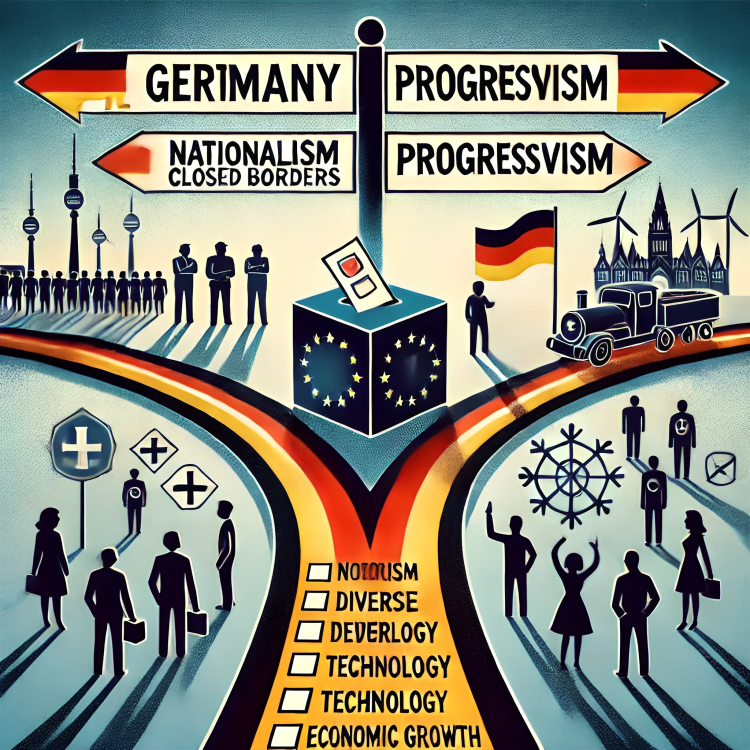Germany Goes to Vote on February 23
The Federal election in Germany, the third largest economy of the world, is a battle between its “Old” and “New” thinking.
EXPERT ANALYSIS
GeopoliticsTv Team
2/21/20254 min read


The Chancellor election in Germany is only two days away (February 23) and the nation is passing through a friction of the Old and the New. In that, the “Old” of Germany is “New” of the world, and the “New” of Germany is what Germany possibly wants to stick to.
History
The Nazi phase of Germany that led to the rise of Adolf Hitler and eventual involvement in the Second World War, is not what Germany and its people want to be known and recognised by. This is Germany’s past, history or the Old—the right-wing.
Nazism was an ideology that aimed to unite all Germans living in historically German territory, exclude those who had immigrated into but did not historically live in German region, discriminating on the basis of a superior race-inferior race world-view.
Nazism also aimed at expansion of the German territory through the means of war.
After the World War, the outlook of Germany took a complete turn only to open up itself with a “New” outlook—and since 1950, Germany received more than 19 million immigrants into its territory, which is around 23% of its population.
After the War, Germany engaged itself in not just reconstructing itself on its economy, but on its political ideology.
The rise of the far Right-wing and why Mainstream politics wants to avoid it
The AfD is 12-year-old, and this is the first time the party has fielded a candidate, Alice Weidel, for the Chancellor election. She is a firebrand leader and holds significant place in the politics of Germany.
The new party is running a slogan: "Alice fuer Deutschland", which is hit in Germany but the mainstream political parties see problem in it. This political line has the threat of taking Germany back to its Old, which it has given up soon after the War and marched ahead.
However, history has an uncanny rule—It Revisits.
According to the latest reports, AfD is polling a huge 21% vote share of the electorate in Germany.
What has led to the rise of the “Old” in Germany?
Germany is the world’s third largest economy, next to the United States of America and China. It is known for its technology and many other things. However, over the last few years, other nations are giving it a tough competition in many areas at the global market.
AfD has been getting support from the global political developments on issues like immigration and economy, and has earned its ground in German politics.
In the recent past, political parties in many nations including the West and the East, rode on the wave of right-wing political thought to reach power. This has a direct impact on Germany’s politics and is all too visible in the Chancellor election this time.
Germany has conservative parties, but AfD is believed to be far-right. The AfD is seeking curb on immigration, and young generation are attracted to it more than the old. the AfD wants to keep Germany first, and stop Germany fund nations, like Ukraine, in wars.
A few days back, a car rammed into a gathering in Munich, supposedly by an Afghan national, which killed a woman and her daughter, and injured 39 people. This incident also played fuel for the AfD line of political thinking.
The Mainstream political parties
None of the mainstream political parties like Social Democratic Party—Olaf Scholz running as Chancellor; Christian Democratic Union of Germany, Christian Social Union in Bavaria Christlich-Soziale Union in Bayer, and others want to take the support of AfD to form the next government.
However, buoyed by the global anti-migration wave, as well as tech-billionaire Elon Musk’s endorsement, AfD appears to have gained good ground just before the nation goes to polling on February 23.
However, there is also an equally strong base of “Never again Fascism”thinking, and Germany wants to keep Fascism at a bay.
The Electorate
A total of about 59 million people are eligible to cast their votes. About 10-million non-German citizens who reside in Germany won’t be casting votes.
Emerging scenario after February 23
Two prominent personalities are front-runners: Chancellor Olaf Scholz of Social Democratic Party and his main rival Friedrich Merz of the conservative Christian Democratic Union.
Merz is a conservative but not far-right, and the growing support for AfD is reportedly pushing him further to the right, which is a concern among the older generation voters, who want to keep Fascism away.
The two are set to have to clash on a debate that focuses on issues of migration, economy and security. Interestingly, these three issues are global issues that every nation of the world today is highly possessive of, including the ones that recently held their federal elections.
The AfD is reportedly doing well in the election, which complicates the matter for the mainstream parties. Both Scholz and Merz have so far been ruling out the possibility of coalition with the AfD.
What then?
Germany has witnessed Russia-Ukraine war that drained a good amount of its wealth. It has witnessed fall of a coalition government led by Scholz, following which the nation has been looking for a government that will set the economy right, and possibly adopt a wise policy on immigration that keeps the interest of Germans.
The federal election is resulting in the formation of a government—a coalition again, but if the government fails to deliver on the aspirations of Germans, the AfD is waiting to ride on the Old wave of Germany—which is the New wave in nations in some parts of the world.
